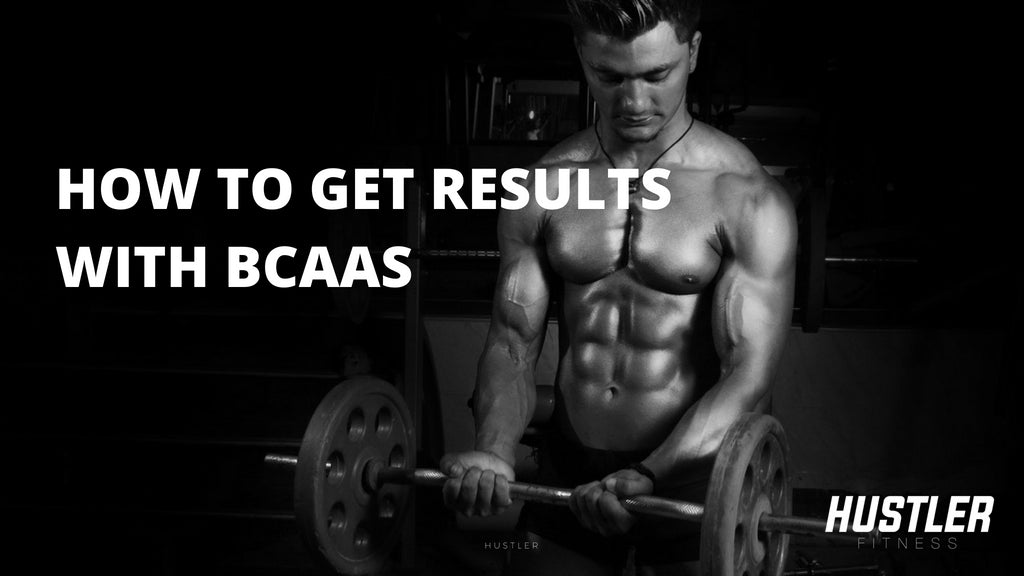BCAAs, or branched-chain amino acids, are very useful compounds for people who are working out. They’re particularly important for my guys killing it following Shredded program!
If you really want to get Shredded, then it's worth consider BCAA supplements. But don't think it's so straight forward. There's a lot of misinformation out there.
So today I’m going to tell you all about BCAAs, their benefits and drawbacks, dosages and when to take them so you can figure out if they would be a good addition to your workout program.
Let's break it down.
What are BCAAs?
BCAAs have come to be renown as something as a lifesaver for people who take part in intense workouts. They’re useful supplements that can improve your endurance and recovery speed.
Branched chain amino acids are helpful because they encourage the body not only to function better but to heal quicker. They provide a reliable source of energy for you to use after you’ve exhausted your initial reserves.
Your body quickly depletes the amount of glycogen that it stores when you’re working out. After you run out of glycogen, you’re pretty much left to rely on 3 specific types of BCAAs for your remaining energy: leucine, isoleucine, and valine. These are the 3 most common BCAAs found in workout supplements.
What makes it so important to take BCAAs in your diet form is the fact that your body can't produce them on its own. They need to be ingested externally so you can take advantage of them. There are two main sources of BCAAs:
-
Supplements. BCAA supplements are quite popular and can be found at health food stores or workout supplement stores.
- From food. There are a number of foods that are high in BCAAs. The densest food sources of BCAAs are chicken breast, beef, tuna, salmon, haddock, turkey, eggs, quinoa, chickpeas, lima beans, and brazil nuts.
Are BCAAs That Beneficial?
There is certainly some hype surrounding BCAAs that’s not necessarily true.
They are absolutely helpful for improving your overall strength and endurance. However, some people have come to me asking if BCAAs are magical supplements that will immediately bolster their performance and make them invincible. This simply isn’t the case.
BCAAs can be taken to help improve the speed at which your body recovers and they’ll probably make you feel less tired after a workout. They do provide you with extra energy so you’ll be able to work out for longer periods.
Just don’t expect to be able to run an extra 5K after popping your first BCAAs.
Leucine also provides some unique BCAA benefits. It’s known to help improve the body’s sensitivity to leptin, a hormone responsible for making you feel hungry. On the other hand, it helps the body burn fat and regulate blood sugar. This can be immensely useful for people who are watching their levels.
When Should I Take BCAAs?
The important thing to make note of is that you don’t need to take BCAAs everyday, or even during every workout.
Remember the process by which your muscles grow. During intense workouts, you’re shredding your muscles a bit so they undergo hypertrophy. After this, your body rebuilds the muscles stronger so they won’t tear again. Continuing to do this builds strength and muscle mass.
Taking BCAAs before or during this process will greatly accelerate it. People who regularly engage in strength and interval training may want to use BCAAs everyday. People who just exercise to maintain overall fitness will only need them after very intense workouts.
Before deciding to take BCAAs, there are some things to consider.
-
Your size and weight will influence the amount that you need to take
-
Your gender will have a bit of an effect.
-
The intensity and duration of your workout will also determine your BCAA needs. If you’re just going for light jogs then you won’t need to take them very often
- Your health and age. It’s important to talk to a medical professional before taking any BCAAs if you suffer from any health problems
Fitness researchers have suggested that it’s a good idea that you time when to take BCAAs and eat your meals around your workouts. It’s recommended to eat some within an hour of finishing your workout. This will likely inhibit any fatigue you may be feeling.
BCAAs and Shredded
People who are taking part in the Shredded program will almost always find some benefit in taking BCAA supplements on a regular basis. Several times a week could prove beneficial, particularly during the most intense workout sessions.
For example, during the first week of Shredded training, there are six days a week in which you’ll be expected to hit the weights in the evening. Of these six nights, three nights will involve doing cardio exercise in the evening as well.
The three nights that include cardio would be great nights to take your BCAA supplements. Not only will they help you to heal up but they’ll give you a bit of a kick to help you conquer your evening cardio.
The workout routines meal plan suggests taking 10 grams of BCAAs during intra workout and another 10 grams post-workout.
How Much Do I Need?
It’s generally suggested that you only need between 3 and 5 grams of BCAAs per serving. This isn’t hard to get in your diet -- you can get this just from eating a few ounces of animal protein. A good chicken breast will supply more than enough BCAAs for your body.
It’s more important that you time your BCAA consumption around your workout to make sure that they’re present in your body when you need them.
Vegans and vegetarians may have a more difficult time getting enough BCAAs. There are a number of vegetable sources that can provide BCAAs, such as brown rice, quinoa, beans, wheat, and nuts. However, vegans and vegetarians may want to consider taking BCAA supplements.
BCAA Supplements
BCAA supplements are useful because they can provide you with the same nutritional compounds without as many calories.
Capsule Supplements
Capsule supplements are great because they allow you to ingest nutrients that you would otherwise need to consume an entire cooked meal to obtain. They’re often made with whey protein or soy protein so they’re generally friendly for people who don’t eat meat.
Liquid Supplements
Liquid BCAA supplements can be an attractive idea for all sorts of people because they’re absorbed by the body a lot quicker. This means that they can be useful for people who don’t have time to plan meals surrounding their workouts.
Certification
The most important thing to take note of when buying a supplement, whether it’s for BCAAs or otherwise, is to make sure that the supplement is third-party certified. NSF and Informed Choice are two good examples of reputable authorities. If you see their stamp on a supplement you can be assured that it’s real and high-quality.
If you want to eat your BCAAs before your workout but don’t want to have food bouncing around in your stomach, supplements are a good idea.
Making the Most of BCAAs
BCAAs are great on their own, but they can be made to be even better if you know some tips and tricks about making the most out of them.
If you want to maximize your benefits then you could consider taking a natural testosterone booster with your BCAAs. There are several natural testosterone boosters that have been shown not only to be highly effective but quite healthy for you in other ways.
-
Pine pollen, for example, is the most potent natural source of testosterone on the planet and it can provide wild muscle growth and stamina without any side effects.
- Natural supplements including mixtures of ginger and garlic have been shown to be quite useful for naturally enhancing testosterone levels
It’s also important that you ensure with your doctor or fitness expert that there are no contraindications with your BCAA usage and your current medical health.
Are BCAAs vegan?
BCCAAs occur naturally in plants and therefore many BCCA supplements are vegan and vegan-friendly. Personally, I am always sure to ask the manufacturer before purchasing to make sure it is suitable for a vegan diet. One such supplier who offers vegan-friendly BCAAs is the brand Bulk Nutrients.
BCAA Side Effects and Precautions
There are a few things to be aware of when you’re considering buying or taking BCAAs.
The first thing to make note of is what’s in your supplement. This is why I’ve mentioned that it’s so important to get a certified supplements. It’s easy for a manufacturer to throw in some unpleasant or dangerous ingredients without you being aware. Read the labels!
Make sure that there are no artificial sweeteners or anything in your BCAA supplement. Many of them are filled with unhealthy sweeteners that can have a negative impact on your health. Xtend, for example, is known as a supplement that causes bloating and can actually inhibit the healthy growth of muscle tissue.
Side Effects
It’s generally considered safe to take BCAA supplements. However, some people are sensitive to them and it should be noted that it is certainly possible to take too much. ‘Too much’ is generally considered upwards of 40 grams on a daily basis.
If you take high doses of BCAAs everyday then you’re liable to experience some of these side effects.
-
Reduced endurance. Though BCAAs are generally known to help enhance endurance, taking high doses all the time will actually reduce your insurance by as much as 43%.
-
Fatigue and lost coordination. This occurs if you take more BCAAs than your body can easily process. This can make it dangerous to drive or operate machinery (including the machines in the gym).
-
Lower insulin resistance. BCAAs can help to regulate blood sugar when used normally but taking too much can actually mess up your insulin resistance and contribute to diabetes.
-
Taking extremely high doses of lutein has been shown to increase the amount of ammonia present in the blood. This can cause serious problems.
- Eating too many BCAAs can cause digestive problems such as nausea, bloating, and cramping
Precautions
It’s important that people who struggle with previous medical conditions avoid BCAAs unless you’ve talked to your doctor first. People who suffer from ALS or have kidney problems, liver problems, or heart problems should straight up avoid taking BCAAs.
If you want to avoid any of the above side effects then you should spread your doses out throughout the day to minimize the amount of stress that the BCAAs will put on your body. Even if you’re taking reasonable doses, some people may find they get uncomfortable taking their entire dose at once.
Wrapping Up: Should You take BCAAs?
BCAAs are a great supplement that can improve the results of your workouts and help you heal faster.
Hopefully I’ve given you enough information about BCAAs for you to decide whether or not you’d like them to be a part of your workout routine. Be cautious, just like with any supplement, and I hope that things workout between you and BCAAs.
While you're here, make sure you're getting the best training, supplement and diet tips (for free) here.
Train hard,
Daniel





1 comment
Where to buy the supplement